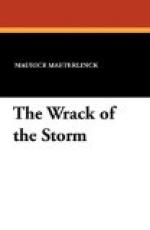FOOTNOTES:
[Footnote 9: August, September and October, 1915.]
* * * * *
THE WILL OF EARTH
XX
THE WILL OF EARTH
1
To-day’s conflict is but a revival of that which has not ceased to drench the west of Europe in blood since the historical birth of the continent. The two chief episodes in the conflict, as we all know, are the invasion of Roman Gaul, including the north of Italy, by the Franks and the successive conquests of England by the Anglo-Saxons and the Normans. Without delaying to consider questions of race, which are complex, uncertain and always open to discussion, we may, regarding the matter from another aspect, perceive in the persistency and the bitterness of this conflict the clash of two wills, of which one or the other succumbs for a moment, only to rise up again with increased energy and obstinacy. On the one hand is the will of earth or nature, which, in the human species as in all others, openly favours brute or physical force; and on the other hand is the will of humanity, or at least of a portion of humanity, which seeks to establish the empire of other more subtle and less animal forces. It is incontestable that hitherto the former has always won the day. But it is equally incontestable that its victory has always been only apparent and of brief duration. It has regularly suffered defeat in its very triumph. Gaul, invaded and overrun, presently absorbs her victor, even as England little by little transforms her conquerors. On the morrow of victory, the instruments of the will of earth turn upon her and arm the hand of the vanquished. It is probable that the same phenomenon would recur once more to-day, were events to follow the course prescribed by destiny. Germany, after crushing and enslaving the greater part of Europe, after driving her back and burdening her with innumerable woes, would end by turning against the will which she represents; and that will, which until to-day had always found in this race a docile tool and its favourite accomplices, would be forced to seek these elsewhere, a task less easy than of old.




